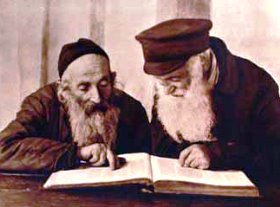
How can we deepen our appreciation for God’s infinite greatness?
The 19th psalm offers two methods. The first is to reflect on the beauty and order of the universe. Thus, the first half of the chapter describes the power and majesty of the heavenly bodies. “The heavens declare God’s honor, and the sky proclaims His handiwork” (Psalms 19:2).
With the eighth verse, however, the psalmist makes an abrupt change. He then utilizes a second method to contemplate God’s greatness. The rest of the psalm reflects on the Torah — its qualities of truth, clarity, and perfection. The Torah, he notes, restores the soul, providing wisdom even to the foolish; and its laws enlighten and gladden the heart.
Words of My Mouth, Reflections of My Heart
The psalm closes with a request:
יִהְיוּ לְרָצוֹן אִמְרֵי-פִי וְהֶגְיוֹן לִבִּי לְפָנֶיךָ, ה', צוּרִי וְגֹאֲלִי. (תהילים י"ט:ט"ו)
May the words of my mouth and the reflections of my heart find favor before You — God, my Rock and Redeemer. (Psalms 19:15)
Why does the psalmist mention “the words of my mouth” before “the reflections of my heart”? Do not people first think and only afterwards speak?
The psalmist notes our innate fallibility. “Who understands errors? Restrain Your servant from deliberate sins too; let them not dominate me” (Psalms 19:13-14).
While recognizing the truth of God’s Torah, we may struggle observing it as faithfully as we should. We are held back due to human weaknesses, the limits of our intellect, and character flaws. The raging storms of our physicality can overwhelm our spiritual aspirations as we yearn for ever-greater holiness. How can we protect and nurture our strivings for holiness?
Two Spiritual Gifts
The answer lies in two God-given gifts. One internal, one external.
The first gift is the heart’s inner core of purity. When the psalmist speaks of “the reflections of my heart,” he is referring to this inner kernel of holiness. Ultimately, we will uncover within ourselves rays of pure, Godly light. When we are able to free ourselves from the darkness of our imaginings, when we are able to overcome our hesitancy and fears and look toward the inner self, our heart’s thoughts will be imbued with holiness. Our heart’s reflections will be illuminated by the source of true, lofty life.
While our inner core of holiness transcends entire worlds, it can be overwhelmed by the rush of everyday life. Therefore, God provided us with a second, external power: the power of holy speech. When we verbalize holy words in Torah study and prayer, we revive the dormant holiness of the inner heart. The lofty kernel, our true essence, is like a princess who has been kidnapped against her will. We can rescue her by employing the faculty of holy speech. This is the secret power of speech when it articulates the hidden treasure that resides in the soul.
For this reason, the psalmist first speaks of “the words of my mouth.” Our words of Torah and prayer are able to revive our inner core of holiness, “the reflections of my heart.” We pray that both of these spiritual gifts will enable us to live favorably before God — “my Rock and Redeemer” — Who redeems us from the emptiness of mundane life.
(Adapted from Olat Re’iyah vol. II, pp. 60-61)